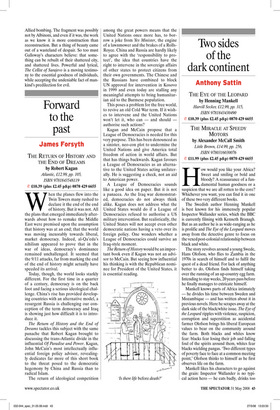Forward to the past
James Forsyth
THE RETURN OF HISTORY AND THE END OF DREAMS by Robert Kagan Atlantic, £12.99, pp. 105, ISBN 9781843548119 ✆ £10.39 (plus £2.45 p&p) 0870 429 6655 When the planes flew into the Twin Towers many rushed to declare it the end of the end of history. But it was not. All the plans that emerged immediately afterwards about how to remake the Middle East were premised upon the assumption that history was at an end; that the world was moving inexorably towards liberal, market democracy. Indeed, al-Qa’eda’s nihilism appeared to prove that in the war of ideas, democracy’s dominance remained unchallenged. It seemed that the 9/11 attacks, far from marking the end of the end of history might actually have speeded its arrival.
Today, though, the world looks starkly different. For the first time in a quarter of a century, democracy is on the back foot and facing a serious ideological challenge. China’s rise has provided developing countries with an alternative model, a resurgent Russia is challenging our conception of the term democracy and Iraq is showing just how difficult it is to introduce it.
The Return of History and the End of Dreams tackles this subject with the same panache that Robert Kagan brought to discussing the trans-Atlantic divide in the influential Of Paradise and Power. Kagan, John McCain’s most intellectually influential foreign policy advisor, revealingly dedicates far more of this short book to the threat posed to the democratic hegemony by China and Russia than to radical Islam.
The return of ideological competition among the great powers means that the United Nations once more has, to borrow a joke from Yes Minister, the engine of a lawnmower and the brakes of a RollsRoyce. China and Russia are hardly likely to agree with the ‘responsibility to protect’, the idea that countries have the right to intervene in the sovereign affairs of other states to protect citizens from their own governments. The Chinese and the Russians have combined to block UN approval for intervention in Kosovo in 1999 and even today are stalling any meaningful attempts to bring humanitarian aid to the Burmese population.
This poses a problem for the free world, to revive an old Cold War term. If it wishes to intervene and the United Nations won’t let it, who can — and should — authorise such actions?
Kagan and McCain propose that a League of Democracies is needed for this very purpose. This has been denounced as a sinister, neo-con plot to undermine the United Nations and give America total freedom of action in world affairs. But that has things backwards. Kagan favours a League of Democracies as an alternative to the United States acting unilaterally. He is suggesting a check, not an aid to American power.
A League of Democracies sounds like a good idea on paper. But it is not a panacea. As the Iraq war demonstrated, democracies do not always think alike. Kagan does not address what the United States would do if a League of Democracies refused to authorise a US military intervention. But realistically, the United States will not accept even other democratic nations having a veto over its foreign policy. One wonders whether a League of Democracies could survive an Iraq-style moment.
The Return of History would be an important book even if Kagan was not an advisor to McCain. But seeing how influential his thinking is with the Republican nominee for President of the United States, it is essential reading.










































































 Previous page
Previous page